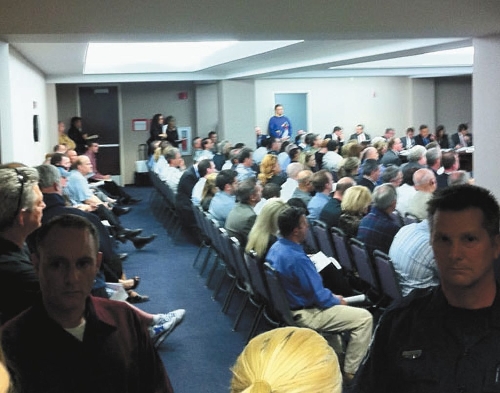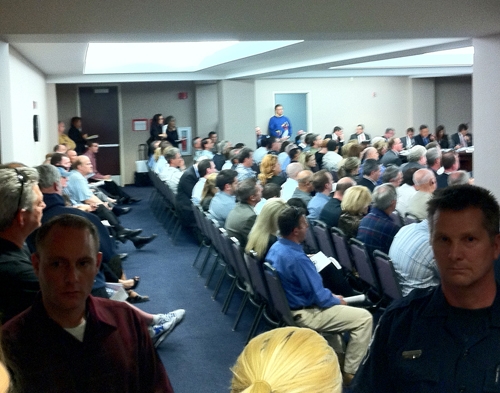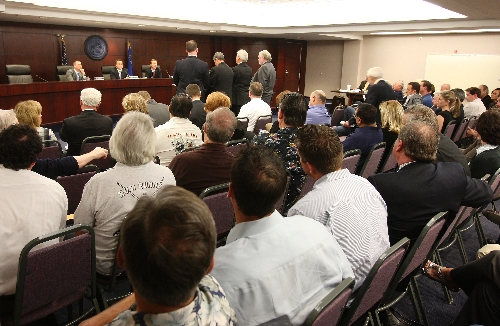Arguments aired over defining taverns



After nearly two hours of discussion Wednesday on what constitutes a tavern, a Las Vegas businesswoman added a bit of levity to a Gaming Control Board workshop.
Tina Goss, who owns the land at the corner of Jones Boulevard and Blue Diamond Road that houses a Dotty’s Gaming & Spirits location, asked state gaming regulators not to change the law that governs tavern businesses.
The recession halted development of her 11,000 square foot retail center, except for Dotty’s, a 15-slot-machine tavern that even the company’s gaming consultant termed as the "controversial establishment."
Goss told control board members that some of the revenues she and her husband receive from Dotty’s are discretionary income they spend at Station Casinos’ Red Rock Resort.
That brought a hail of laughter from the hearing room.
A few hours earlier, Station Casinos Executive Vice President Scott Nielson, representing the Nevada Resort Association, proposed changing the gaming regulation defining a tavern that would all but eliminate the Dotty’s business model.
Dotty’s, which Resort Association members labeled both a "slot arcade" and "slot parlor" was the focal point of the workshop, which allowed the control board to gather opinions on the state regulation that covers restricted gaming licenses, which are issued for locations with a limited number of slot machines.
Although the hearing centered on Dotty’s, Control Board Chairman Mark Lipparelli said the discussion was not about "one restricted location." No action was taken on the regulation.
The hearing drew casino company representatives, tavern owners, slot machine route operators and gaming attorneys and consultants. The attendance exceeded 111-person capacity of the control board’s hearing room at the Sawyer Building and many attendees were left standing in the hallway.
Dotty’s, which has 64 locations statewide and has been operating since 1995, has drawn the ire of some rival tavern operators and the Resort Association.
Dotty’s locations don’t operate kitchens so smoking is allowed. Dotty’s offers customers prepackaged food and minimal beverage options, including beer, and focus heavily on gaming. None of the Dotty’s locations have bar-top slot machines.
But the businesses are considered taverns under state and county laws, ordinances and regulations.
Nielson said the state doesn’t benefit from money wagered at Dotty’s because the restricted locations, unlike traditional casinos, don’t pay gaming taxes on revenues, just a fee per slot machine.
"They are not taverns. They are slot are slot arcades," Nielson said.
The Resort Association suggested several changes to the regulation that would define a tavern. Nielson suggested all taverns should have 2,500 square feet, two-thirds of the slot machines had to be located in a bar meeting local health standards, have a restaurant with 50 seats, and sell liquor by the glass.
Joe Wilcox, who owns the Brewery tavern in Henderson, agreed with Resort Association’s proposal, telling the Gaming Control Board that the tavern industry has suffered because of the recession and a voter-enacted ban smoking where food is served.
Wilcox said he spent $75,000 to wall off his restaurant.
"The revenues aren’t out there for some of the guys to do that now," Wilcox said. "Dotty’s are nothing but slot parlors and tavern owners are hanging on by their fingers."
However, others said the Resort Association’s proposals would hurt the entire tavern industry.
Herbst Gaming CEO David Ross, former Nevada Gaming Commission Chairmen John O’Reilly and Bill Curran, and Roger Sachs, who owns the Steiner’s taverns and is current president of the Nevada Tavern Owners Association, said the regulation shouldn’t be touched.
"I’m concerned with going down a path of a competitive issues rather than a regulatory issue," Ross said.
O’Reilly said that when the regulation was developed during his tenure as Gaming Commission chairman in 1990, slot machines at restricted locations made up roughly 9.7 percent of all the state’s gaming devices. Today, that figure is 9.8 percent.
"Nothing is broken," O’Reilly said.
Randy Miller, who owns the Foothill taverns, said he attempted to operate the Dotty’s business model with his Molly’s locations, but has not had the same amount of success.
"That model is not the savior of the tavern industry," Miller said. "Taverns are an endangered species and what (the Resort Association) is proposing will kill jobs and cause people to go out of business."
Many who attended the hearing said the arguments have diverted away from Dotty’s. Defining what figure best describes when gaming is incidental to a business’s revenues could harm all taverns.
At some Dotty’s locations, according to Clark County, gaming revenues account for upward of 90 percent of cash flow.
Dotty’s representatives sat quietly at the back of the hearing room. At the end of the meeting, consultant Patty Becker said the businesses are taverns and not slot-machine arcades.
However, when asked by control board member A.G. Burnett what was the primary business of the tavern, Becker said "social interaction."
"It doesn’t have barstools because our clients don’t want barstools," Becker said. "Dotty’s doesn’t advertise and the business is by word-of-mouth. Dotty’s has put tens of millions of dollars into the Southern Nevada economy."
Contact reporter Howard Stutz at hstutz@reviewjournal.com or 702-477-3871.
TAVERN TIFFWHAT’S NEW: Gaming regulators held a workshop on a proposal to change the gaming regulation defining a tavern that would essentially eliminate Dotty’s locales.
WHAT’S AT ISSUE: Representatives of major casinos say taverns such as Dotty’s derive a major portion of their income from gaming and should pay Nevada gaming taxes.
WHAT HAPPENS NEXT: The Clark County Commission will address the matter April 5.












